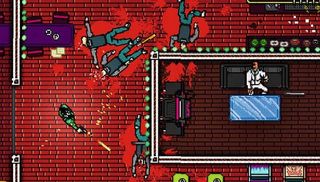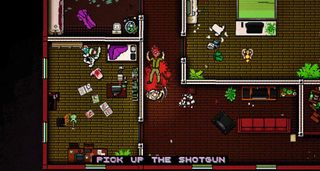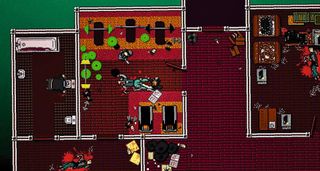Hotline Miami 2: Wrong Number hands-on

Warning: due to the content of Hotline Miami 2, this preview includes discussion of sexual violence.
Last year, a top-down melee-machine of a game was released: it was neon, vibrating and crushingly violent; you could feel the crunch of your avatar's crowbar up your arms. That blinding flash of an insulin rush – mash every 1980s-styled henchman into a pulp with a selection of throwaway weapons at super-speed. The rhythm of the soundtrack, the tap of the restart button, the puzzle of stealth assassination mixed with your own keen will to clean the room, to the beat. To the beat: that was the beauty of Hotline Miami.
Playing Hotline Miami 2 is darker, murkier, grubbier. The simple elegance is complicated by the pressing of an embroidered narrative into what is an overstitched kill-complex. The environments are more visually detailed, the suits more splattered and the rooms more cluttered. The weapons are slightly more exotic: I picked up a chain at one point, certain of my brutality. But previously, your descent into gangster hell was a little tourniquet holding the levels of Hotline Miami together. Now, it seems like the characters are, in an unwelcome way, attempting to leap from the screen. Different characters take the lead now, each with their own killing style, and first up is Pig Butcher.

Finishing up the tutorial, I'm certain that I'm playing more of the game I like – no – love. I've wiped the place of guys, watched them crawl around hopelessly in their own guts. I get to the final room. There's a girl that it seems germane to hit like the other dudes. 'FINISH HER', the game says: I feel conflicted, but it'll be over soon. I stroll up to finish the job. Instead, the control is taken from me by the game, and my character, the Pig Butcher, pins her down and drops his trousers.
I'm on the show floor at Rezzed 2013. It's a place where I feel welcome, a quiet place where my friends and colleagues chat smiling in low voices, but now a sense of alienation is creeping over me.
I feel resentment. This is what those hordes of gamers who constantly hound the academic Anita Sarkeesian, creator of Tropes vs Women in Video Games barrage her mailbox with. Whelps of wretched stomach lining. This is how they feel when someone points out that games are sexist. 'This is it,' I think. 'I am feeling betrayal. I feel betrayed by something I love. I feel betrayed.'

Stay with me while I dissect these feelings, feelings I do not want: I certainly want someone to blame for this betrayal, because it hurts that something I enjoy so much would be this problematic, so upsetting. I'd like to blame Sarkeesian for making me aware that this happens in the games I like – but it isn't her fault that I am aware. And it starts to make me feel incredibly hypocritical: you liked the violence, I think. You liked, as the game says, hurting people. Why do you feel ugly now, for playing a game where your character rapes a woman? It isn't even graphic, but implied. These are pixels, Cara. Just pixels.
The biggest gaming news, reviews and hardware deals
Keep up to date with the most important stories and the best deals, as picked by the PC Gamer team.
But it's because I identify as a woman. The woman in this game was exoticised by her tokenism. No male character in this scenario was singled out for rape. It has made my safe space – where I am a powerful thug who isn't accountable to anyone – no longer safe. I have been forced to identify with the one person the game has given no agency. My agency has been removed not only from Pig Butcher, but agency was never given to the woman I now identify with – not even AI. Your arsenal has expanded. Hotline Miami manages to convey seediness well in two dimensions. The colour palette's the same, too.

How can you enjoy yourself in a game if you are the victim of every brutal crime, and not the perpetrator of them? A horrible question – but it's about freedom, power, and who gets to have those things. The sexual violence at the end of that tutorial will single out a fifth of the female audience who have experienced sexual violence. I'm thinking about them when I turn back to the game.
Pig Butcher drops his trousers, and the director at the side of the screen yells “cut”. “Pig Man, well done, but don't be afraid to be rougher. And you there, blondie – you need to work on your femininity. Act more helpless and scared. You know, more girly.”
But this framing comes too late. Hotline Miami 2 has already used her for shock and power. Videogame women don't get very many other roles to play but the helpless damsel. I played the rest of the excellently constructed murder simulator demo in silence, and left feeling uncertain of why I was so upset. It was because I was manipulated.
Most Popular

